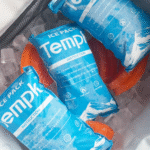How Dry Ice Pack Sheets Optimize Cold Chain Delivery Systems in 2025
Ensuring temperature-sensitive goods remain intact during transit is a significant challenge in cold chain logistics. Dry ice pack sheets have become a vital solution for businesses shipping perishable products such as food, pharmaceuticals, and biological samples. This article explores how dry ice pack sheets enhance delivery efficiency, improve safety, and meet regulatory compliance while reducing environmental impact.
-
How do dry ice pack sheets enhance delivery efficiency?
-
What makes dry ice pack sheets a better option than traditional ice or gel packs?
-
What are the key best practices for using dry ice pack sheets in shipping?
-
How can businesses optimize their dry ice delivery systems with these sheets?
How Do Dry Ice Pack Sheets Enhance Delivery Efficiency?
Dry ice pack sheets are designed to provide consistent, reliable cooling, crucial for products requiring freezing or refrigeration during transport. Unlike traditional ice, dry ice sublimates into gas without leaving liquid residue, offering superior benefits:
-
Prolonged Cold Retention: Dry ice can maintain temperatures as low as -21°C for up to 24 hours, ideal for long-distance shipments without the mess of melted ice.
-
No Water Residue: Dry ice’s sublimation prevents liquid leakage, avoiding damage to products or packaging.
-
Reusability: Many dry ice pack sheets are reusable, providing long-term cost savings and reducing environmental waste.
Practical Impact: For instance, frozen food shipments like seafood or baked goods benefit from the consistent cooling that prevents spoilage, while pharmaceutical products like vaccines remain at the correct temperature throughout transit.
What Makes Dry Ice Pack Sheets Better Than Traditional Ice Packs?
When it comes to cold chain logistics, the type of cooling method used can significantly affect the product’s quality upon arrival. Let’s compare dry ice pack sheets to traditional ice packs:
| Feature | Dry Ice Pack Sheets | Traditional Ice Packs | Practical Impact |
|---|---|---|---|
| Temperature Range | -21°C for up to 24 hours | Around 0°C | Keeps items frozen vs. chilled |
| Duration | Up to 24 hours per sheet | Less than 6 hours | Extends delivery distance without refreezing |
| Residue | Sublimates to gas, no liquid residue | Water residue | Prevents soggy packaging and contamination |
| Reusability | Reusable after reactivation | Limited | Reduces waste and long-term costs |
Dry ice pack sheets offer an extended cooling period and better temperature control compared to traditional ice or gel packs. With their reusable nature, they also align better with sustainable business practices.
Best Practices for Using Dry Ice Pack Sheets in Shipments
1. How Much Dry Ice is Needed for Optimal Delivery?
The required amount of dry ice depends on the shipment’s duration, the type of goods being transported, and the environmental temperature during transit. Typically, 5-10 lbs per 24 hours of shipment is recommended. For longer shipments or larger quantities, adjust accordingly to ensure consistent cooling.
2. The Importance of Proper Packaging
Insulated packaging plays a vital role in minimizing heat exchange. Use insulated, ventilated containers to maintain a cold environment. Ventilation is crucial because dry ice sublimates into gas. Airtight containers could cause dangerous pressure buildup.
3. Safety Compliance and Labeling
Always mark packages containing dry ice with a “Carbon Dioxide Solid” label. This labeling ensures the shipment is handled correctly, adhering to international shipping regulations such as IATA (International Air Transport Association) and DOT (Department of Transportation) guidelines.
4. Temperature Monitoring for Dry Ice Shipments
To maintain optimal cold storage, integrate temperature monitoring devices into shipments. These tools offer real-time tracking, enabling businesses to monitor the temperature throughout transit and take corrective actions if needed.
Real-life Example: A seafood business shipped fish across the country using dry ice pack sheets. By using the right amount of dry ice and ensuring proper ventilation, they maintained product quality and met customer expectations.
How to Optimize Dry Ice Delivery Systems?
1. Review Historical Shipping Data
Understanding previous shipments helps businesses determine optimal dry ice amounts, effective packaging methods, and better route planning. Use this data to fine-tune dry ice usage, reduce waste, and optimize cost-efficiency.
2. Invest in Advanced Logistics Tools
AI-driven logistics platforms and real-time temperature monitoring systems can predict shipment conditions and help optimize dry ice usage. These technologies improve route efficiency and ensure the cold chain is maintained.
3. Collaborate with Cold Chain Experts
Partnering with experienced logistics providers specializing in cold chain solutions can significantly improve shipping reliability and ensure adherence to best practices in temperature-sensitive delivery.
Emerging Trends in Dry Ice Delivery for 2025
As the demand for temperature-sensitive goods increases, so does the need for better cold chain logistics solutions. Key trends in dry ice delivery include:
-
Eco-Friendly Insulation Solutions: Businesses are moving towards sustainable insulation materials, offering enhanced cooling while reducing environmental impact.
-
Real-Time Temperature Monitoring Advancements: IoT-enabled temperature monitoring devices are now providing real-time visibility, allowing businesses to make quicker decisions and reduce spoilage risks.
-
Smart Packaging Solutions: Some companies are integrating interactive packaging that enables customers to track their shipments in real time, improving transparency and satisfaction.
Frequently Asked Questions
Q1: How long do dry ice pack sheets last during transit?
Dry ice pack sheets can maintain cold temperatures for up to 24 hours. Their duration can be extended when combined with multiple layers or additional refrigerants.
Q2: Can I reuse dry ice pack sheets?
Yes, with proper care, dry ice pack sheets are reusable, making them a cost-effective and eco-friendly option for businesses.
Q3: Do I need special documentation when shipping dry ice?
For non-hazardous goods, dry ice doesn’t require a full Dangerous Goods Declaration but must be marked with “Carbon Dioxide Solid, UN 1845.” For hazardous goods, a full declaration is required.
Conclusion and Recommendations
Dry ice pack sheets are essential for businesses involved in cold chain logistics, particularly for shipping temperature-sensitive goods like food and pharmaceuticals. By following best practices for packaging, monitoring, and safety, businesses can ensure efficient delivery while minimizing costs and environmental impact.
Actionable Suggestions:
-
Evaluate your current cold chain processes and consider integrating dry ice pack sheets for temperature-sensitive shipments.
-
Invest in IoT-based monitoring tools to ensure real-time visibility and prevent potential shipment issues.
-
Partner with experienced cold chain logistics providers to enhance the reliability of your dry ice delivery system.
About Tempk
At Tempk, we specialize in providing advanced cold chain logistics solutions. Our range of dry ice pack sheets and temperature monitoring devices ensures your shipments arrive safely and at the required temperatures. With a focus on sustainability and innovation, we are committed to supporting your business with efficient, compliant, and cost-effective shipping solutions.
Contact us today for tailored cold chain logistics solutions.
























